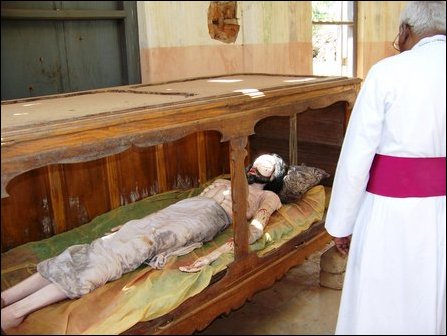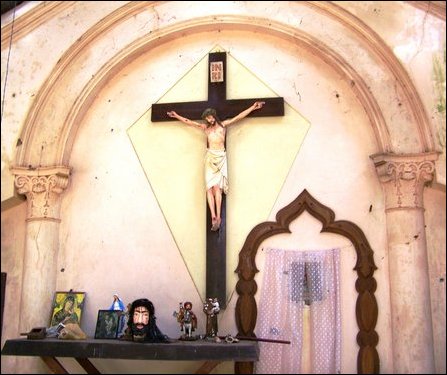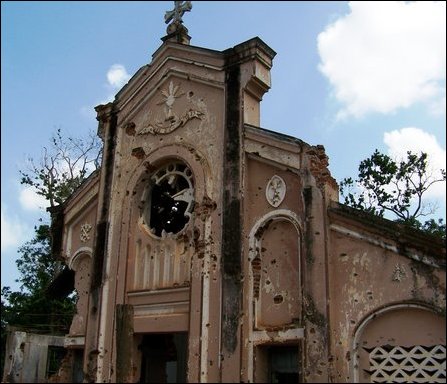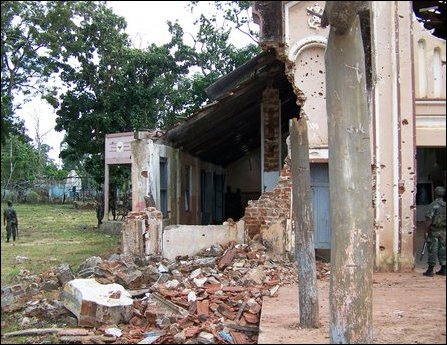"Instead of making connections with the illegitimate opposition of Sri Lanka, Venezuela should be strengthening the hand of an ally that is also suffering imperial aggressions," says Eva Golinger, a friend of the President of Venezuela and English editor of the Venezuela government newspaper Correo del Orinoco. Writing a feature of factual and perceptual errors, Golinger says, Rajapaksa who is supported by left and communist parties put an end to the LTTE that has strong ties with the CIA. Tamil circles don’t believe that the reputed left-wing writer failed to do her homework on Sri Lanka or on the Eezham Tamil struggle. Instead, they think that in a world where the villains and the heroes are together nowadays, some forces are working on luring Latin America to enter into South Asia from the wrong direction, hanging onto the deceptive red shawl of Rajapaksa soaked in genocidal blood.

Eva Golinger, a Venezuelan-American attorney and writer, is the English editor of the Correo del Orinoco, a paper backed by the Venezuelan government. She became popular for her publication The Chavez Code, which cracked the code of intervention of the United States in Venezuela.
A few days before Golinger wrote her opinion, Sri Lankan ambassador in Cuba, Tamara Kunanayakam, rushed to Venezuela to spearhead a diplomatic campaign and misinformation campaign against the struggle of Eezham Tamils.
The ambassador in Latin America, whose Tamil surname is misused in the game of deception, gave an interview last week, denying the existence of a liberation struggle of Tamils, genocide, concentration camps etc in the island. She painted a rosy picture of the Rajapaksa regime, which in her luring words is working for one of the fastest growing economies and “a feeder to rapidly growing China and India,” and thus could become a regional centre and “major gateway to India.”

Tamara Kunanayakam, Sri Lankan Ambassador to Cuba
But, many leftists all around the world were puzzled what made Eva Golinger a well-known anti-imperialist to twist facts and views in favour of an ethnic-chauvinistic state that demonstrated to the world for the first time that a genocidal war could be fought without witnesses and a long-standing national question of a people could be crushed, by having all the imperialists on its side to abet or actively participate.
Golinger, outlining the potentialities and prospects of Sri Lanka in her article, wrote: “Rajapaksa, a Buddhist leader, is supported by a coalition of parties of the left, amongst them the Communist Party. In May 2009, it was able to end the civil war, putting a stop to the armed organization the Liberation Tigers of Tamil Eelam (LTTE).”
“The LTTE has strong ties with the CIA, and Washington negotiated an agreement with them to establish a military base in its country, were they able to get to power. Soon after their defeat, the LTTE established numerous organizations – fronts in different countries around the world, searching to create a 'government in exile' and to be able to isolate the current Government of Sri Lanka. Last week, representatives of one such front, Canadian Hart, passed through Venezuela; he met with government functionaries looking for support in an attempt to weaken relations between the two governments,” was Golinger’s simplified understanding of one of the most complex crises of contemporary world polity.
“Instead of making connections with the illegitimate opposition of Sri Lanka, Venezuela should be strengthening the hand of an ally that is also suffering imperial aggressions,” she concluded.
In fact two months before Golinger writing her article, Sri Lanka’s ambassador Tamara came out with almost identical points on the potentiality, prospects and the US designs involving the LTTE, while addressing Centre for Studies on Asia and Oceania in Cuba, appealing to the audience that Cuba and Sri Lanka are on the same boat in resisting the US imperialism.
As Golinger is considered seriously because of her contribution to Latin America’s anti-imperialist struggle, many leftists cared to come out with responses.
“Eva Golinger’s misinformation endangers exiled Tamils’ fight for freedom,” said five Latin American solidarity groups in Canada in a joint statement.

VHeadline News Editor Patrick J. O'Donoghue
The USA also drew up an agreement with Sri Lanka for military relations and had declared the Tamil Tigers a terrorist organisation despite the Tigers have been combating the Sri Lanka state dominated by the Sinhalese for decades, he said.
It is not the first time that the Venezuelan President Chavez has been caught out internationally, and it is hoped that his government will study the case of Sri Lanka with care, he further wrote.
The most detailed and extensive response has come from Ron Ridenour, a veteran US born but now Denmark-based leftist and anti-imperialist, who voiced against the US aggression on Cuba in 1961, jailed in the US for his views on several occasions and contributed extensively to the study of Latin America.

Ron Ridenour, a veteran journalist, author and editor, who worked for decades for anti-imperialist ideology with a special focus on Latin American affairs, is author of several books including Cuba Beyond the Crossroads (2006) and Cuba at Sea (2008).
Bringing out her factual errors, explaining how the US supported the genocide of Tamils, revealing how the US which didn’t want to be seen in the forefront operated in the war against the Tamils through Israel, where the Latin American ALBA countries let down Tamils and discussing the war crimes of Sri Lanka, Ron Ridenour says, “Instead of opposing the Yankee Empire, her [Golinger’s] position is allied with imperialist United States and its allies Zionist Israel, the United Kingdom and other former European colonialists, as well as the emerging superpower and worker-exploiter China.”
“As solidarity activists, we advocate the right to resist and the necessity to conduct armed struggle once peaceful means fail to induce oppressive governments to engage in a process aimed at justice and equality—such is the case in Sri Lanka with the Tamil people, just as surely as it is in Palestine. [...] solidarity activists have no choice. We must support the Tamil people.” Ron Ridenour said.
When the Eezham Tamil struggle stood up all alone against all the imperialists of the world, this test case of human civilisation was ignored by the so-called anti-imperialists of the Golinger brand and was allowed to end up in genocide, Tamil circles commented.
Some of the establishments of the anti-imperialists even ganged up in the UN Human Rights to save the Sri Lankan state that received all support from all the imperialists of the world in the war.
Now both the imperialists and anti-imperialists alike want to strengthen the genocidal state of Sri Lanka and want to compete for the dividends coming from the winner.
While on one hand selling the land and resources to the imperialists, by the other, Rajapaksa paints a sympathetic picture to the gullible or the opportunistic ones – ultimately aimed to complete the genocide by hoodwinking the world. An ethnic-majoritarian and totalitarian state strategically located is convenient to corporate colonialism of the imperialists.
The so-called anti-imperialists are playing in the hands of one or the other imperialists competing in Sri Lanka – if not the US then India or China, Tamil circles commented.
When have the anti-imperialists of the Golinger brand started looking at peoples in struggle through the colonially imposed state frame work, just like the establishments of the world, ask Tamil circles.
What is happening in South Asia is the conquest of corporate colonialism enacted by imperialists through what is called ‘Matsyanyaya’ or the ‘law of the fishes’ said in ancient South Asian philosophy, i.e., the big fish eating the small.
The Sinhala state, which is not prepared to recognize the land and sovereignty of Eezham Tamils is now forced to forfeit the entire land and sovereignty to imperialists and is wailing for help. Yet it is adamant to succumb than conceding Tamil rights and strengthening the island.
Why not the anti-imperialists in Latin America tell Sri Lanka to first resolve the national question?
India was a partner to Sri Lanka in crushing the Tamil national struggle and now may be getting the returns. But the US is there now pressing for corporate interests in India including in educational institutions.
If the anti-imperialists want the law of the fishes not to become the law of the humans then they have to start from the lowest level of the chain. They should demonstrate what could be done for the Eezham Tamils. Handling imperialism at the state level, either at the Sri Lanka level or at the India level will not give confidence to the masses in countering imperialism.
If the Latin American anti-imperialists are really ignorant of what is happening in Sri Lanka and what is righteous about the struggle of Eezham Tamils, then it is a serious matter for the perusal of Eezham Tamil activists and leftists among Tamils.
TamilNet has been long cautioning political organisation efforts of Eezham Tamils not only to maintain independence in organising polity but also to be transparently seen as independent.
The leftists among Eezham Tamils and in Tamil Nadu have a noble role in telling the outside world why the liberation of Eezham Tamils is a test case for contemporary human civilisation. They have a responsibility in shaping the struggle and in seeing that it gets the due status.
Many Eezham Tamils have noticed with pain that the current reality about the trajectory of their struggle has not even gone to the academics and intellectuals in North India, when they encounter questions from learned North Indians that 'what should now worry the Eezham Tamils since the LTTE is no more.'
External Links:
| VHeadline: | Editorial: Eva Golinger and the Tiger Tamils | |
| RonRidenour.com: | Backing the Wrong Side: Eva Golinger's Tamil Libel | |
| Dissidentvoice: | Ron Ridenour: Eva Golinger Misinterprets Solidarity | |
| Daily Mirror: | Interview with Tamara Kunanayakam, Ambassador of Sri Lanka to Cuba | |
| SLMFA: | Tamara Kunanayakam: Sri Lanka, Geostrategic Importance, Present Situation And Challenges Ahead | |
| HandsOffVenezuela: | Sri Lanka: English translation of Eva Golinger's original article | |
| VHeadline: | Eva Golinger's misinformation endangers exiled Tamils' fight for freedom | |
| HandsOffVenezuela: | Sri Lanka and Venezuela - A Debate | |















